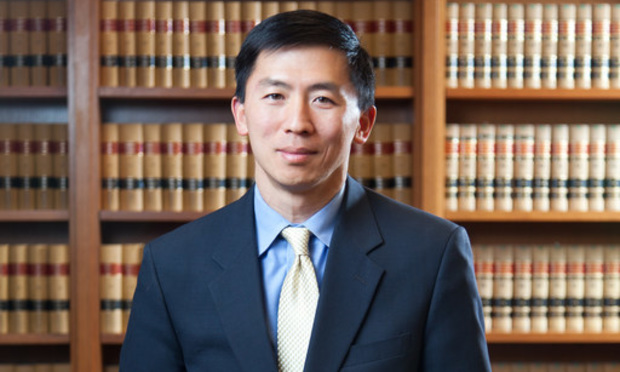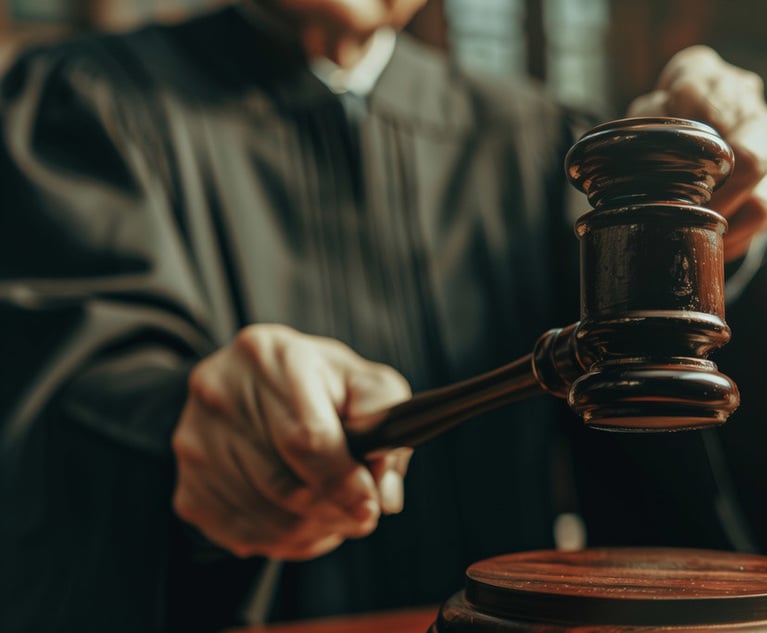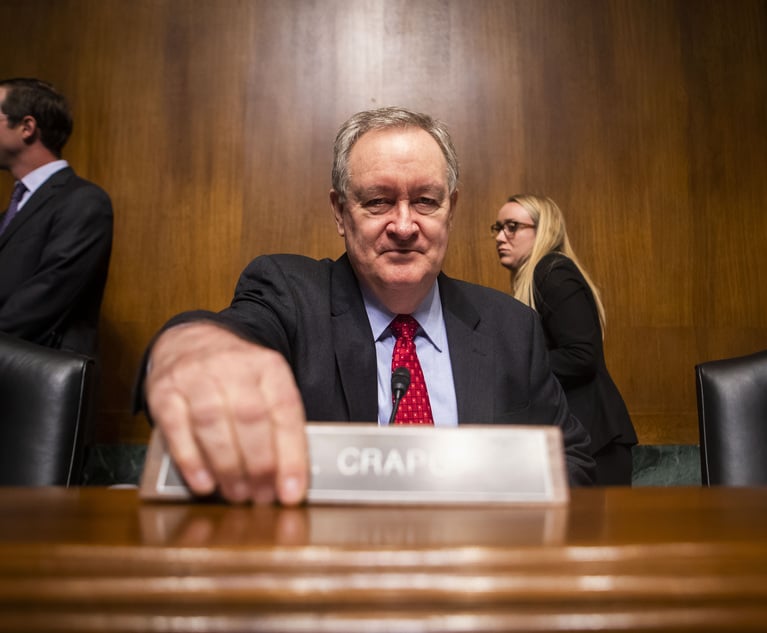Law Clerk Diversity: 'It's Complicated'
California Supreme Court Justice Goodwin Liu, former judge and Federal Judicial Center director Jeremy Fogel, and the ABF team up to improve the minority clerk hiring process.
September 26, 2019 at 09:58 AM
5 minute read
 Justice Goodwin Liu, California State Superme Court
Justice Goodwin Liu, California State Superme Court
A new effort is underway to find the answer to a quandary that has long vexed the federal judiciary: why so few minorities serve as law clerks.
California Supreme Court Justice Goodwin Liu, a former clerk to U.S. Supreme Court Justice Ruth Bader Ginsburg, has joined Jeremy Fogel, a former U.S. district judge and Federal Judicial Center director, and the American Bar Foundation, to delve into the question and come up with positive solutions for judges, law students, professors and other players in the law clerk hiring process.
Liu and Fogel acknowledged the project is not an easy undertaking. Remarkably, little data on the subject is available. And the issue itself is touchy; even judges who want to hire more minority clerks are sometimes uneasy about seeking them out or discussing their hiring process.
"We've been in consultation with a number of judicial colleagues," Liu said in an interview, with the aim of understanding "the sensitivity of this topic and trying to figure out the safest and most comfortable way to talk about a delicate subject."
Fogel said, "It's complicated. The more I dig in to it, the more complicated it looks."
Liu conceived of the idea for the study after participating in a 2017 project chronicling the role of Asian American attorneys in the legal profession. One of the findings was that the percentage of law clerks who were Asian American had remained in low single digits and stagnant for decades, even as the percentage of Asian American law graduates in top schools had risen. (A 2017 National Law Journal story that tallied the demographics of Supreme Court law clerks also found "near-glacial progress" over two decades in the numbers of minorities hired by the justices, especially African American and Hispanic clerks.)
Liu decided to focus exclusively on the clerk landscape of the federal appellate circuit courts, a large but manageable cohort for study. Ajay Mehrotra, executive director of the American Bar Foundation, will seek out the views of 30 law schools that "feed" the most clerks to appellate judges.
The interviews will be held confidential, and Liu stressed that "we are certainly not trying to paint the judiciary in a bad light. We're not trying to paint anyone in a bad light. We're just trying to understand what people perceive the obstacles to be."
One early obstacle: the Administrative Office of the U.S. Courts does not disseminate data on the number of minority law clerks or whether the percentage has gone up or down. In charts involving demographics, clerks are lumped together with other "legal professionals" working in federal courts, such as staff attorneys.
"There is no national collation on the demographics of law clerks," said David Sellers, public affairs officer of the Administrative Office of the U.S. Courts.
Nonetheless, the project is studying three aspects of the clerk mystery: minority students themselves and why they may bypass the opportunity to clerk; law schools and whether they make efforts to encourage minority candidates to seek out clerkships; and the judges' hiring practices and the extent to which they recruit minority candidates.
Liu has already discerned a pattern: "There is a tendency, not in a bad way, for each of these actors in the pipeline to kind of shift responsibility to the other. The judges will say, 'Well, we can only hire the people the schools give us, and it's a pipeline problem.' And the schools will tell you, 'Well, we only send people to the judges based on what they tell us they want.' And then they say, 'Well, we can only do what our students raise their hands to do.'"
As for students, Liu said they "come to law school with such different social and cultural capital." First-generation law students may not be familiar with clerkships and the opportunities they open, preferring law firms instead where salaries are higher than the relatively low pay for law clerks. Some minorities who want clerkships apply mainly to judges who share their race or ethnicity, Liu said. "From personal experience, I get a surfeit of Asian American applicants," said Liu, the son of Taiwanese immigrants.
One positive move Liu pointed to is the newly revised clerk hiring plan that pushes back the date when federal judges can recruit clerks, a change that may give law students more time to blossom and to see the importance of a clerkship.
As for judges, some appear to be reluctant to ask their "feeders" to supply them with clerk candidates based on race or ethnicity rather than conventional criteria. In a 2017 National Law Journal report on the dearth of minority law clerks at the Supreme Court, several feeder professors said they had never heard from justices that they were seeking out minorities.
By contrast, when Justice Brett Kavanaugh was a judge on the D.C. Circuit, he made a point of speaking directly with minority law student organizations about clerkships. "A big part of it is demystifying the process, having a conversation about how it works, and encouraging the students to apply," he told The National Law Journal in 2017. Ten of his minority clerks went on to clerk at the Supreme Court.
Fogel mentioned another idea that judges could consider to "move in the right direction" toward diversity among clerks. He cited the essay written in January by California U.S. District Judge Vince Chhabria that urged judges to adopt the National Football League's so-called "Rooney Rule," which requires team owners to consider at least one minority candidate when hiring a new head coach.
"If you rely on the traditional channels, you end up finding people like you," Fogel said. "Having an echo chamber is not a good thing."
This content has been archived. It is available through our partners, LexisNexis® and Bloomberg Law.
To view this content, please continue to their sites.
Not a Lexis Subscriber?
Subscribe Now
Not a Bloomberg Law Subscriber?
Subscribe Now
NOT FOR REPRINT
© 2025 ALM Global, LLC, All Rights Reserved. Request academic re-use from www.copyright.com. All other uses, submit a request to [email protected]. For more information visit Asset & Logo Licensing.
You Might Like
View All
Who Are the Judges Assigned to Challenges to Trump’s Birthright Citizenship Order?

Senator Plans to Reintroduce Bill to Split 9th Circuit

'If the Job Is Better, You Get Better': Chief District Judge Discusses Overcoming Negative Perceptions

Fight Over Amicus-Funding Disclosure Surfaces in Google Play Appeal
Trending Stories
- 1Former Director's Retaliation Suit Cleared to Move Forward Against Hospice Provider
- 2New York Judge Steps Down After Conviction for Intoxicated Driving
- 3Keys to Maximizing Efficiency (and Vibes) When Navigating International Trade Compliance Crosschecks
- 4Houston Law Firm Files $250K Breach of Contract Suit Against 2 Former Lawyers
- 5The Week in Data Feb. 3: A Look at Legal Industry Trends by the Numbers
Who Got The Work
J. Brugh Lower of Gibbons has entered an appearance for industrial equipment supplier Devco Corporation in a pending trademark infringement lawsuit. The suit, accusing the defendant of selling knock-off Graco products, was filed Dec. 18 in New Jersey District Court by Rivkin Radler on behalf of Graco Inc. and Graco Minnesota. The case, assigned to U.S. District Judge Zahid N. Quraishi, is 3:24-cv-11294, Graco Inc. et al v. Devco Corporation.
Who Got The Work
Rebecca Maller-Stein and Kent A. Yalowitz of Arnold & Porter Kaye Scholer have entered their appearances for Hanaco Venture Capital and its executives, Lior Prosor and David Frankel, in a pending securities lawsuit. The action, filed on Dec. 24 in New York Southern District Court by Zell, Aron & Co. on behalf of Goldeneye Advisors, accuses the defendants of negligently and fraudulently managing the plaintiff's $1 million investment. The case, assigned to U.S. District Judge Vernon S. Broderick, is 1:24-cv-09918, Goldeneye Advisors, LLC v. Hanaco Venture Capital, Ltd. et al.
Who Got The Work
Attorneys from A&O Shearman has stepped in as defense counsel for Toronto-Dominion Bank and other defendants in a pending securities class action. The suit, filed Dec. 11 in New York Southern District Court by Bleichmar Fonti & Auld, accuses the defendants of concealing the bank's 'pervasive' deficiencies in regards to its compliance with the Bank Secrecy Act and the quality of its anti-money laundering controls. The case, assigned to U.S. District Judge Arun Subramanian, is 1:24-cv-09445, Gonzalez v. The Toronto-Dominion Bank et al.
Who Got The Work
Crown Castle International, a Pennsylvania company providing shared communications infrastructure, has turned to Luke D. Wolf of Gordon Rees Scully Mansukhani to fend off a pending breach-of-contract lawsuit. The court action, filed Nov. 25 in Michigan Eastern District Court by Hooper Hathaway PC on behalf of The Town Residences LLC, accuses Crown Castle of failing to transfer approximately $30,000 in utility payments from T-Mobile in breach of a roof-top lease and assignment agreement. The case, assigned to U.S. District Judge Susan K. Declercq, is 2:24-cv-13131, The Town Residences LLC v. T-Mobile US, Inc. et al.
Who Got The Work
Wilfred P. Coronato and Daniel M. Schwartz of McCarter & English have stepped in as defense counsel to Electrolux Home Products Inc. in a pending product liability lawsuit. The court action, filed Nov. 26 in New York Eastern District Court by Poulos Lopiccolo PC and Nagel Rice LLP on behalf of David Stern, alleges that the defendant's refrigerators’ drawers and shelving repeatedly break and fall apart within months after purchase. The case, assigned to U.S. District Judge Joan M. Azrack, is 2:24-cv-08204, Stern v. Electrolux Home Products, Inc.
Featured Firms
Law Offices of Gary Martin Hays & Associates, P.C.
(470) 294-1674
Law Offices of Mark E. Salomone
(857) 444-6468
Smith & Hassler
(713) 739-1250








